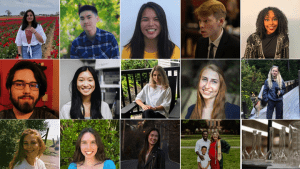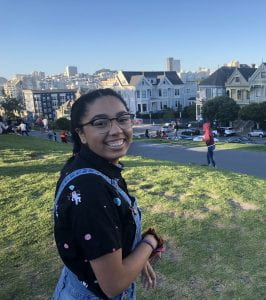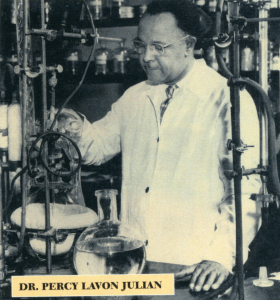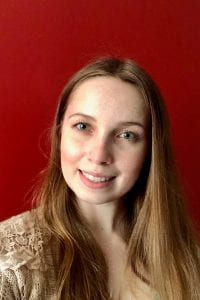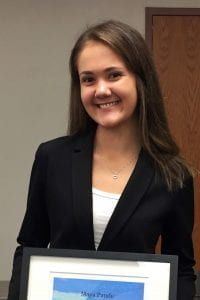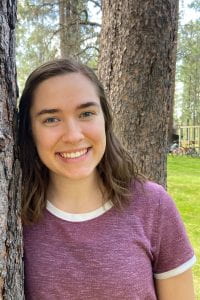The Chemistry and Biochemistry department is pleased to announce the recipients of our 2022 undergraduate scholarships! The department offers five annual scholarships for our undergraduate majors, with the application and selection process taking place each spring.
This years’ recipients are William Jackson, Esther Mozipo, Maisie Topping, Nicolas Nguyen, Sarah Peabody, and Lily Miller. We asked them to tell us a little bit about themselves and their research.
The Kuntz-Swinehart Memorial Scholarship recognizes academic excellence in our majors, and was established by former UO Chemistry students in honor of two professors whose instruction, influence and inspiration had a significant impact on their career paths.
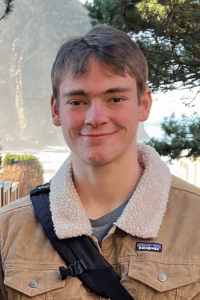
Kuntz-Swinehart Recipient
William Jackson
I am a senior majoring in Biochemistry with a minor in Biology. I am originally from Redwood City, California, but I spent a lot of time in San Francisco growing up! I first became interested in science when I wanted to understand more about nutrition and how our dietary choices impact our bodies. In doing so, I became fascinated with the application of scientific discovery to human health and wellness. Today, I am most interested in understanding the complexities of life at the molecular level in hopes of contributing to our understanding and treatment of disease.
My Research: I have been working in the Garcia Lab since October of 2020. Under the mentorship of David Garcia and Ethan Shaw, I have been exploring the capacity for human proteins to assume alternate conformations as a way of adapting to environmental stressors and providing a mechanism of protein-based inheritance. During my time in the Garcia Lab, I have learned countless new skills that will continue to serve me as I continue my career in science.
What’s next?
Upon finishing my undergraduate degree at the UO, I plan on pursuing a career in biomedical research, as I am most interested in how we can apply what we learn about life on the molecular level to improving human health. In order to pursue this career, I plan on applying to graduate school with the hopes of earning a Ph.D.
It is an honor to receive this award and I am extremely grateful for all of the opportunities I have had available to me at the UO. Go Ducks!
The Percy Julian Scholarship seeks to support talented undergraduate scientists in their pursuit of a career in chemistry and recognizes their contributions to promoting diversity, equity, and inclusion in STEM and their potential for further academic achievement.
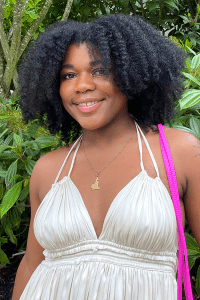
Esther Mozipo
My name is Esther and I’m from Portland Oregon. I started at UO in the fall of 2019 and I’m a now a senior. The thing about science that has always amazed me is that the concepts of chemistry I learned in middle school are just as important as the topics I learn in upper division classes in discovering new things about chemistry.
My research: I am in the Hettiaratchi Lab and I’ve been there for about a year. The Hettiaratchi lab is in the Knight Campus which is focused on interdisciplinary research and is one of the main reasons I decided to join the lab. My research focuses on using chemistry to make hydrogels that can help heal bones, and using biology to ensure that those hydrogels can support cell life.
What’s next? I’ve been conducting research for less than a year and I know there’s so much left for me to learn, and I plan to pursue a PhD in bioengineering so I can deepen my understanding of the principles that govern the research I’m doing now. At the end of the day, I want to be able to use my skills to serve those who are traditionally overlooked. My goal is to use bioengineering to make advances in women’s fertility and health.
The Faith Van Nice Scholarship is dedicated to the legacy of alumna Faith Van Nice, and recognizes exceptional UO undergraduate students majoring in Chemistry or Biochemistry.
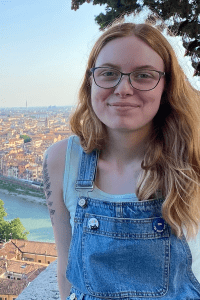
Maisie Topping
I grew up in Portland and am a senior here at UO studying biochemistry and French. I have known I wanted to study biochemistry since I took AP chemistry my junior year of high school and absolutely loved it. Learning science is so cool because I walk through the world with a sort of double vision; I have what my eyes and ears are sensing about my surroundings, but I also have this knowledge of the processes underlying the things most of us take for granted. I love understanding why and how things are the way they are, and chemistry is the perfect amount of nitty-gritty that still feels incredibly connected to the world around me.
My research: I joined the Nolen lab at the very beginning of my second year here, so this September will mark 2 years in research. Our lab studies the biochemistry of the actin cytoskeleton, a complex structural system in eukaryotic cells that is vital to a huge number of cellular functions. Notably, deregulation of the actin cytoskeleton has been linked to a variety of diseases, including cancer. Previous work in the lab has characterized several families of small organic molecules that inhibit the assembly of the actin cytoskeleton and are very useful research tools. My current project seeks to develop a method to quantitatively analyze the effect of these molecules on cytoskeleton dynamics in live cells.
What’s next? My biggest post grad plan is to adopt a cat and take some deep breaths! I want to attend graduate school somewhere down the line, but before that I want to explore working in industry for a while. I know that I want to be involved in research for the rest of my life, and the specifics will be worked out along the way, but if I had to bet on my eventual direction I would say something protein biochemistry. Once of the biggest things I’ve learned in college is that my future is fluid and will change as I see more of the world and figure out what I like, but if my path happens to lead me to a Nobel prize yes that would be great.
I want to thank the selection committee for choosing me for this award. Reading Faith’s biography made me cry and it is an honor to even be associated with her name. Pursuing undergraduate research has been the best decision I’ve made at UO, made all the more wonderful by my lab mates, so big thanks to the Nolen lab for their support. I can’t wait to see where the next few years take me!
The P-Chem Undergraduate Fellowship provides funding for students to conduct research during the summer in a physical chemistry lab at the University of Oregon, under the mentorship of a physical chemistry faculty member.
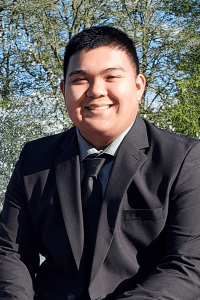
Nicolas Nguyen
I was born and raised in Portland, Oregon my entire life and still consider Portland my home. Before coming to the UO, I graduated from David Douglas High School in 2019, and am expected to graduate from the UO in 2023 with a major in chemistry and a minor in computer information technology. I became very interested in science back in elementary school where we did basic experiments like the egg vacuum experiment or the vinegar and baking soda volcano. I became fascinated in understanding how these simple experiments work, and this fascination carried with me throughout K-12, making science classes always my favorite. Chemistry ended up being my favorite science class in high school because it seemed to have the answers to everything in the universe. This is obviously not true, but where there is something unknown or not well studied, there is a chemist out there that will try to study it. Chemistry’s pursuit to explain how and why things work is why I love it, and it is why I am pursuing it in college.
My research: I am currently doing research in Professor Marina Guenza’s lab, which I have been a part of for a year now. My focus in the group is applying machine learning techniques to coarse-grained simulations of polymers to reconstruct the atomistic information that is lost when the polymer is coarse-grained. The system I am working with is polyethylene, as it is one the more basic polymer chains and a good start at learning and using machine learning.
What’s next? Once I graduate from the UO, I am planning to go to graduate school and pursue more education. I want to continue to do research, particularly in the field of materials chemistry, but I find all chemistry research fascinating. Being more exposed to the research of other chemists has driven me to do want to do research in graduate school, and possibly even after I finish all my education.
I am honored and excited to have received this fellowship opportunity. I am grateful to the professors and staff at the UO who have made my experience with chemistry a good one. I have learned so much and have gained experience that I know will aid me as I aim towards even higher education. I am also grateful to Marina Guenza and the entire Guenza lab for being open to accepting me as a member as well as supporting my work. Lastly, I would like to thank my friends and family who have gotten to watch me grow up and pursue what I love and supporting me every step of the way.
The Anita and Friedhelm Baitis Scholarship provides funding for two undergraduate students to conduct research during the summer in a chemistry or biochemistry laboratory at the University of Oregon, under the mentorship of a Chemistry and Biochemistry department faculty member.
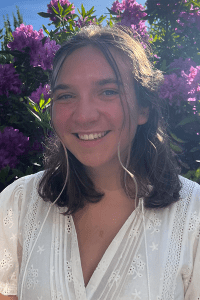
Sarah Peabody
I am a a senior from Portland, OR. I was not always interested in science, but, with very little idea of where it would take me, applied to UO as a biochemistry major and now cannot imagine doing anything else. Life science as a field is fascinating because we are exploring pieces of the world at a microscopic level, and we have just begun to scratch the surface of understanding the intricacies of the biological, chemical, and physical processes that are so important to human life.
My research: I began working in the Hansen Lab during the spring of my sophomore year. We study the way immune cells communicate within themselves and with each other in a process called cell signaling. At the plasma membrane, cell signaling allows these cells to respond to cues, such as getting an infection, in the body. My project focuses specifically on understanding the human white blood cell signaling molecule P-Rex1. Overall, we want to improve our understanding of how these membrane signaling reactions occur in cells and how these processes are altered in human disease.
What’s next? In the future, I would like to take my background in biochemistry to a medical biotechnology company. Medical biotechnology is an ever-growing field that in recent years has been filled with incredible scientific improvements in areas such as vaccine development, disease treatment, and design of new medical devices. Ultimately, I would like to be involved in design, development, and marketing of these new technologies.
My undergraduate research experience at UO has been incredible and would not be what it is without the help of many professors, graduate students, and undergraduates. I am so grateful to them and to my classmates at UO who inspire me every day to continue to achieve my goals.
= = = = = = = = = = = = = = =
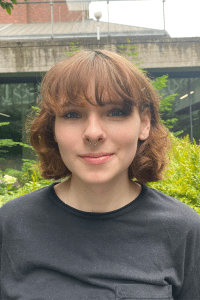
Lily Miller
I grew up in Huntsville, Alabama, and came to UO as my dad is from Oregon and I wanted to follow in his footsteps. I am entering my sophomore year at UO and am pursuing a degree in biochemistry. I have been interested in science ever since I was young, when my parents got me a microscope for my birthday. Science gives me a chance to make a positive impact on the world in a way that I would not be able to otherwise, and therefore has always been a passion of mine.
My research: I am in the Prell Lab, a group focused on mass spectrometry. I joined the Prell lab in my freshman year, after being told again and again how important research is as a science major. My research is mainly focused on the development of software that helps other groups and researchers improve their interpretation and processing speed of mass spec data. I am working on two main projects right now. My first project is a collaboration with the Laskin group, writing software to improve the computational times and usability of their method of imaging proteins in tissue samples using mass spec. This research will be used in the future to help develop a new form of imaging using mass spec, as a counterpart to staining, and will be specifically used in the detection of cancer in tissues. My second project is focused on automating the data processing of mass spec data through a collaboration with Children’s Hospital of Philadelphia. This research will be used to allow faster and easier detection of diseases using mass spec.
What’s next? Once I graduate, I am interested in going to medical school, or pursuing a higher-level degree. When I join the scientific workforce, I would like to find a job that combines my programming knowledge with my love of science, in a field where my work can directly help others.
I am honored to receive this award, and thankful for the chance to be able to do research this summer. I would like to give a special thank you to Professor Prell and my lab mates for taking me into their lab and giving me the chance to do research.








